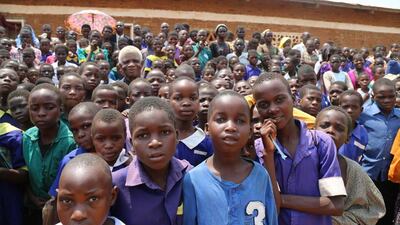Thyolo, MALAWI // Every day at 6.30am, Lucia Bwbzani sets off on her daily 10-kilometre walk to school, where she dreams of becoming a radio journalist.
Lucia’s trek along a dusty, red-dirt track is a familiar one for hundreds of her schoolmates, many without shoes and each desperate for an education.
She and her friends could be a step closer to staying in school after Dubai Cares said it would give Dh1.8 million to Thyolo district schools, making that arduous trek a little more bearable for the next two years.
“It takes me about an hour to walk to school each morning. I have this dream of being an announcer on the radio and to see the world with my job,” said Lucia, 14.
“It is difficult for my parents as I have two sisters who are younger, so it is expensive for them. It will be hard for all of us to finish school.”
Lucia’s friend and classmate Eaveline Limiton, also 14, has a similar journey to classes. She hopes to complete her secondary education in an area where only 57 per cent of girls do.
“We do not have many books in school but I read my father’s newspaper when I’m home to learn new words,” said Eaveline, who has three brothers also at school.
“Maths and English are my favourite. It is tough living so far from school. There is a small bus but there are many children, so most of us walk.
“Some of my friends have stopped going to school. One is getting married.”
Eaveline’s father, a photographer, is lucky to have work, although with his meagre wage it is a struggle to pay annual school fees of about US$20 (Dh73) a year. The average wage is about $50 a month.
Many have large families, making education too expensive for some.
In some schools, dropout rates are as high as 50 per cent, with community schools having higher numbers because children often travel great distances on foot to attend. Overcrowded classrooms are a major factor in deterring children from studies.
English teacher Cosmas Chiwanda instructs 100 girls and 80 boys at Nagwengwere Primary School.
“Because the class is so big it is not conducive to learning. Many children drop out because of the hunger problem with many families here,” he said.
“They spend money on food rather than education. Most parents are very poor, so the children drop out – particularly girls. Some get married to get money for their family.
“It is frustrating as some are very talented and want to learn. We try to encourage them as much as we can.”
Thyolo was chosen by the charity because it has some of the lowest transition rates in girls attending the area’s 184 primary schools.
Schools there were considered suitable for financial help because of their rural location in southern Malawi, about an hour’s drive from the commercial capital Blantyre.
Grace Mulewa, who has taught English at Nagwengwere for eight years, said young girls needed more female role models to inspire them to stay in school.
“I faced the same problems when I was a girl and now I am a teacher, so I want to show them it can be done,” she said.
“We try to engage the children if they are thinking of dropping out. Strong female role models are so important but there are not many of them here.”
Not all schools have electricity so some classes are held outside in the scorching heat of the day. Homework is another problem as many homes are without power.
Teachers are appealing for solar-powered lamps that the children can use to study at home.
“I’ve seen a gradual change in my time at the school. Less are getting married very young but it is still happening,” Ms Mulewa said.
“Even those who have had a child can still go back to school. They just need encouragement.”
nwebster@thenational.ae


